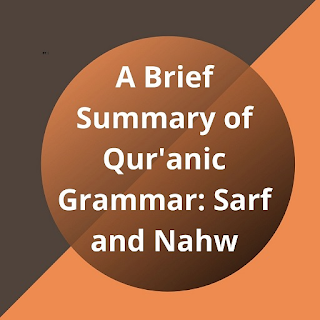Sarf and Nahw Summary: 3.1/3.2/3.3 - Laa/Maa/La/Lamma
3.1 - Types of negative Laa (لَا)
1. Laa Nafi لَا نَفِيْ
This is a simple laa and gives a negative meaning and is inactive, that is it does not change the flexibility (إعْرَاب) of what comes after it. This is used before a noun or a verb as in:
فَلَا خَوْفٌ عَلَيْهِمْ وَلَا هُمْ يَحْزَنُونَ
لَا أعْبُدُ مَا تعبُدُوْنَ
2. Laa Nafi lil-jins لَا نَفِيْ لِلْجِنْس
This is laa is used for exclusivity to cover all kinds and only comes before a noun. this noun is always inflexible (مبني). This laa is used to indicate nouns/sentences of all kinds are covered in it.
لَا إلٰهَ إلَّا اللهُ
There is no deity of any kind except Allah
This means no deity of any kind. The noun after this laa (لَا) is always nakirah and is always mansoob/Accusative. If the noun is flexible (مُعْرَب) after it, then it is called Mushabbah bi-Laisa مُشِبْهَةُ بِلِيْسَ.
3. Laa nahi لَا النَّهِيْ
This laa always comes before a verb and changes the verb into a jussive mood (جزم).
لَا تَضْرِبْ
meaning don’t hit (single, masculine, 2ndperson, active)
لَا تُضرَبْ
meaning should not be hit (single, masculine, 2nd person, passive)
۞۞۞
Section 3.2 - Types of Maa (مَا)
Maa has several meanings and uses depending on the context:
a. Negative maa مَا ضَرَبْتُهُ “I did not him”
b. Interrogative maa مَا هٰذا؟ “What is this?’
c. Maa Zarfia مَا دُمْتُ حَيَّا “As long as I am living”
d. Maa kaaffa إنَّمَاالأعْمَالُ بِالنِّيَّاتِ “Indeed, actions are but by intentions
e. Maa masdaria إفْعَلْ كَمَا يَفْعَلُ “Do as he does”
f. Maa mausoola لَا أعْبُدُ مَا تَعْبُدُوْنَ “I do not worship those who you worship”
g. Maa shartia مَا تَشرَبْ أشْرَبْ “What you drink, I will drink”
h. Maa ta’ajjubia مَا أحْسَنَ زَيْدًا “How good-looking Zaid is”
i. Maa Hijazia مَا هٰذَا بَشَرًا “This is no mortal human”
If maa is used with illa, then illa is used in the meaning of Hasar. It removes the exception/exceptive rule (مُلْغٰى عَنِ الْعَمْلِ) which means the active word Illa has become inactive or is no longer effective.
If a negative maa comes before a noun, then it is used as (مُشَبْهَةُ بِلَيْسَ) mushabbah bi Laisa, that is, active as a negative Laisa requiring a noun and a predicate.
۞۞۞
Section 3.3 - Laam Takeed (لَ)/Ta’leel (لِ)/Hasar(حَصْر)
Laam Takeed (لَ)
a. It can mean an oath (by Allah) (قَسْم)
b. It can also be for (تَاكِيْد) takeed.
(لِ) is called laam t’aleel (لَام تَعْلِيْل) meaning “for”. Before (لِ) the word is called (مَعْلُوْل) ma’lool and after is called (عِلَّة) ‘illat. Used with imperfect tense.
لِ meaning “for/so that”. It is called Lam of Consequence (لَام تَعْلِيْل). This Particle is used for providing an expected result/ consequence of the action in the Verb. This is sometimes also called laam-ul-kai. An example from al-Qur’an:
Al-Bayyina - Verse 5
وَمَا أُمِرُوا إِلَّا لِيَعْبُدُوا اللهَ
And they were not commanded except for worshipping Allah
c. (أنِ المُضْمِرَةً) is Preposition حَرْف جرّ plus “un” (أنْ مَصْدَرِيَة) masdariah.
Hasar (حَصْر) - Exclusivity
Hasar means to surround and it covers all possibilities of the intent. An example of Hasar would be illa (إلَّا) or Hasar meaning can be created by moving forward the pronoun or predicate and rearranging the sentence. Emphasis (تاكيد) is different from Hasar.
Illa is usually used as a particle of exception istesnaa, with mustasnaa and mustasnaa minhu. In some cases, though, this is used as a particle of exclusion (حَصْر). These are combinations of laa/illa, maa/illa and in/illa, lum/illa. Generally, all negative sentences when used with illa will give the meaning of hasar, and then there is no mustasna minhu.
(6:52) إِنِ الْحُكْمُ إِلَّا لِلَّهِ يَقُصُّ الْحَقَّ وَهُوَ خَيْرُ الْفَاصِلِينَ
The decision is only for Allah. He relates the truth, and He is the best of deciders.
- To precede what is supposed to succeed gives the benefit of Hasar/exclusivity and specificity
التَّقْديْمُ مَا حقُّهُ التَّاخِيرُ يُفيدُ الحَصْر والإختِصَاْصَ
An example would be:
اُوْلٰئِكَ صَلَوَاتٌ عَليْهِمْ meaning “They are the ones with blessings on them”. This, when changed to اُوْلٰئِكَ عَليْهِمْ صَلَوَاتٌ, means “They are the only ones on whom are the blessings”
۞۞۞
Section 3.4 - Lamma (لَمَّا)
a. Acts as a particle of akhaf أخَفْon Imperfect verbs.
b. It acts as a resumption particle and the particle (إِنْ) in negative (nor/not), resumption (then) comes before it as in:
إِنْ كُلُّ نَفْسٍ لَمَّا عَلَيْهَا حَافِظٌ (At-Tariq ayah 4)
There is no soul without a Guardian over it.
وَإِنْ كُلٌّ لَّمَّا جَمِيْعٌ لَّدَيْنَا مُحْضَرُونَ (Yaseen ayah 32)
And surely One day they will all be presented before us.
c. Lamma can be an Adverb of time/place (ظَرْفيَة) as in the example above, Jussive (جَازِمِيَة) which is a particle that gives Jussive state جَزَمto the verb, or a Resumption particle (حَرْف اِسْتِئنَافِيَة). An example of (اِسْتِئنَافِيَة) is إن كُلُّ لَمّا جَمِيْعُ الّدَيْنَ مُحْضَرُوْنَ
d. Kana كَانَ when entered on an imperfect verb (الْمُضَارِع), it creates مَاضِيْ إسْتِمْرَارِيْ or near past. For example (كَانُوْا يَدْعُوْنَ) means “they used to be called/asked”.
۞۞۞





Comments